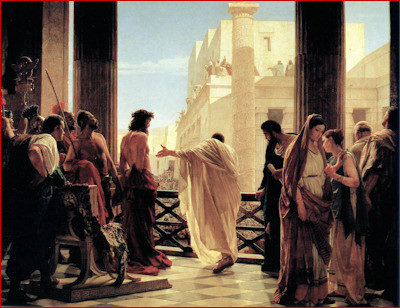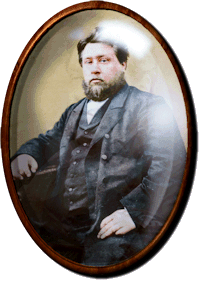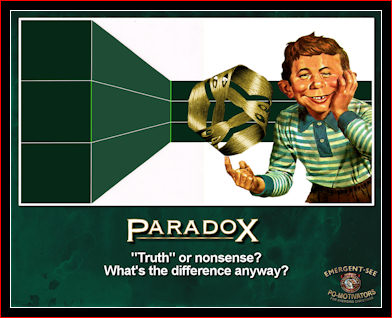by John MacArthur

 he phrase "under the law" occurs at least ten times in Paul's epistles, so we know it is a crucial concept in his theology. In Galatians 3:23, for example, He writes, "Before faith came, we were kept under the law" (Gal. 3:23). Now, however, he says as Christians we are "not under the law" (Gal. 5:18).
he phrase "under the law" occurs at least ten times in Paul's epistles, so we know it is a crucial concept in his theology. In Galatians 3:23, for example, He writes, "Before faith came, we were kept under the law" (Gal. 3:23). Now, however, he says as Christians we are "not under the law" (Gal. 5:18).
I often hear Christians recite the phrase "not under the law, but under grace" as if it meant no standard of law whatsoever is ever binding on believers. Grace is seen as a grand permissiveness, contrasting with the uncompromising moral standard of the law.
One man wrote,
| According to Paul, I am not under law. That has radical practical consequences for my Christian life. It means I do not have to look over my shoulder at the law and judge my life by it. The law was a negative standard. It was filled with prohibitions and punishments. Grace is the opposite. It is filled with positive inducements and promises. Which would you rather have as a rule of life? I live under grace, not law. And that means whenever the law brings its negative message—when it says, "thou shalt not"—it does not apply to me. |
|
The notion that no law is binding on the Christian is
antinomianism. This type of thinking sets grace
against law, as if the two were antithetical. It has some dire theological consequences.
It is crucial to understand that in terms of moral standards, grace does not permit what the law prohibits. "Grace" never signifies the lowering of God's moral demands. The word
grace in scripture signifies a lot of things, but licentiousness is not one of them. In fact, those who turn the grace of God into promiscuity are expressly condemned as false teachers (Jude 4).
Grace according to Scripture is the undeserved kindness of a sovereign God. More than that, grace means that God mercifully gives us the very
opposite of what our sin merits. Grace includes not merely pardon for our sin, but also the power to live a transformed life.

In other words, the grace Scripture describes is a dynamic force—the sovereign influence of a holy God operating in the lives of undeserving sinners. This is the key to grace: it is God working in us to secure our working for Him (Phil. 2:13). Grace first transforms the heart and thus makes the believer wholly willing to trust and obey. Grace then conveys upon us both the desire and the strength to fulfill God's good pleasure. Far more than mere pardon, grace also is a motive for obedience; it gives us a true love for God; it transforms our lives in every sense. Ultimately grace totally conforms us to the image of Christ (Rom. 8:29). Even now, grace is doing what the law could not do: it is fulfilling the righteous requirement of the law in us (Rom. 8:3-4).
So the moral standard set by the law does not change under grace. Indeed, it could not; it is a reflection of God's character. But divine grace actually empowers us to fulfill the moral demands of the law in a way that the law alone could never do.
Just what
does the apostle Paul mean when he says we are not under law? There are two ways Scripture clearly teaches we are not under law:
We are not under the ceremonial lawPaul's epistle to the Galatians uses the expression "under the law" several times (3:23; 4:4-5, 21; 5:18). Paul wrote this epistle to confront the influence of the Judaizers. They were Jewish legalists who were trying to impose the ceremonies and rituals of the Mosaic law on all Christians. According to the Judaizers, in order to become a true Christian, a Gentile first had to become a Jewish proselyte.
Circumcision and the dietary laws became the test issues. This had been a running dispute in the early church from the very beginning. The earliest church council in Jerusalem had been convened to deal with this very question. According to Acts 15:5, some Pharisees who had converted to Christianity rose up and demanded that Gentiles who joined the church be circumcised and directed to obey the law of Moses. Luke records what happened:
The apostles and the elders were gathered together to consider this matter. And after there had been much debate, Peter stood up and said to them, "Brothers, you know that in the early days God made a choice among you, that by my mouth the Gentiles should hear the word of the gospel and believe. And God, who knows the heart, bore witness to them, by giving them the Holy Spirit just as he did to us, and he made no distinction between us and them, having cleansed their hearts by faith. Now, therefore, why are you putting God to the test by placing a yoke on the neck of the disciples that neither our fathers nor we have been able to bear? But we believe that we will be saved through the grace of the Lord Jesus, just as they will." (vv. 6-11).
The council saw a heated debate on the question. But led by James, they ultimately came to consensus: "we should not trouble those of the Gentiles who turn to God, but . . . write to them to abstain from the things polluted by idols, and from sexual immorality, and from what has been strangled, and from blood" (vv. 19-20).
This meant that the ceremonial requirements of the Mosaic law were not to be imposed upon the church. Circumcision could not be required of the Gentiles. Strict adherence to the dietary laws was not to be prescribed. But in order not to offend the Jewish brethren, the Gentiles were asked to abstain from the most offensive dietary practices: the eating of meat offered to idols, the eating of strangled animals, and the eating of blood. Even those restrictions were not imposed as binding matters of legal necessity, but were required of the Gentiles only as a matter of charity toward their Jewish brethren.
How do we know that these prohibitions against eating certain things were not meant to be a permanent standard for the church for all time? As Paul wrote to Timothy, nothing is to be viewed as ceremonially unclean if it is received with thanksgiving (1 Tim. 4:4). But these measures were called for by the Jerusalem Council in the primitive church as a matter of charity to the many Jewish believers who saw such practices as inherently pagan. The apostle Paul summed up this principle of freedom and deference in Romans 14:14-15: "I know and am persuaded in the Lord Jesus that nothing is unclean in itself, but it is unclean for anyone who thinks it unclean. For if your brother is grieved by what you eat, you are no longer walking in love."
A side note is necessary here with regard to the restriction against "fornication." The biblical prohibitions against fornication are moral, not ceremonial, commandments. So why was it necessary to include a ban on fornication in the Jerusalem Council's instructions? After all, fornication would clearly be deemed morally reprehensible and strictly forbidden under
any standard in the early church. And from the beginning the dispute that prompted the Jerusalem Council had to do only with the ceremonial aspects of Moses' law.
The answer lies in an understanding of the pagan religions from which many of these Gentile converts had come. The practice of ceremonial fornication was common. Many of the pagan shrines featured temple prostitutes, with whom acts of fornication were deemed religious experiences. So when they forbid "the things polluted by idols, and . . . sexual immorality," the Council was prohibiting the observance of pagan religious ceremonies. And when they called for abstinence "from what has been strangled, and from blood," they were asking the Gentiles to have respect for the deeply-ingrained scruples of their Jewish brethren, resulting from lifelong obedience to Mosaic ceremonies.
In other words, pagan religious ceremonies were forbidden, and Jewish ceremonies were not made the standard. But charity was enjoined upon all.
It is crucial to see that this Council was explicitly
not establishing the Mosaic ceremonial law—or any portion of it—as the standard for the church. The New Testament is explicit throughout that the types and ceremonies of the Law are
not binding on Christians. The dietary and ceremonial requirements of Moses' law "are a shadow of the things to come, but the substance belongs to Christ" (Col. 2:17). The priesthood and Temple worship of the Old Testament economy also "serve a copy and shadow of the heavenly things" (Heb. 8:5). Christ is the fulfillment of all that, and He is the Mediator of a New Covenant. To cling to the types and shadows of the Old Covenant is in effect to deny that Christ, the One foreshadowed, is superior. Therefore, the ceremonial aspects of Moses' law have no place whatsoever in the Church.
Why did both Paul and the writer of Hebrews view the Judaizers' doctrine as such a serious error? Because by retreating to the types and shadows of the Old Covenant, these people were guilty of replacing the all-important reality of a living Savior with outmoded symbols that only
pointed to Him. Their attachment to those now-barren religious emblems
necessarily thrust them into a system of works. To return to the Old Covenant was a
de facto rejection of Christ in favor of obsolete types and symbols.
In one of the most unusual encounters between two apostles recorded anywhere in Scripture, Peter and Paul had a very public conflict over the question of obedience to the ceremonial law. Paul describes the confrontation in Galatians 2:11-14:
when Cephas came to Antioch, I opposed him to his face, because he stood condemned. For before certain men came from James, he was eating with the Gentiles; but when they came he drew back and separated himself, fearing the circumcision party. And the rest of the Jews acted hypocritically along with him, so that even Barnabas was led astray by their hypocrisy. But when I saw that their conduct was not in step with the truth of the gospel, I said to Cephas before them all, "If you, though a Jew, live like a Gentile and not like a Jew, how can you force the Gentiles to live like Jews?"
The issue at stake here was no longer the question of charity toward Jewish brethren, but the whole doctrine of justification by faith. Apparently, even after the Jerusalem Council had rendered its decision, the Judaizers nevertheless reverted to demanding circumcision for every Gentile convert. They were actually suggesting that observance of the ceremonial law was essential for justification. And as Paul suggests, Peter, of all people, should have known better, "we know that a person is not justified by works of the law but through faith in Jesus Christ, so we also have believed in Christ Jesus, in order to be justified by faith in Christ and not by works of the law, because by works of the law no one will be justified" (v. 16).
We are not under the law for justificationThe centerpiece of New Testament theology is justification by faith. This is the doctrine that makes Christianity distinct. Every other religion in the world teaches some system of human merit. Christianity alone teaches that the merit necessary for our salvation is supplied by God on our behalf.
Justification is defined theologically as that act of God whereby He declares the believing sinner righteous. When God justifies a sinner, he looks at the person and says, I accept that person as completely righteous. It is a divine "not guilty" verdict—and more. It elevates the sinner from the condemnation he deserves to a position of divine privilege in Christ.
Justification poses a huge theological problem. Proverbs 17:15 says, "He who justifies the wicked and he who condemns the righteous are both alike an abomination to the Lord." In other words, God Himself strictly forbids us to declare a guilty person righteous. And God says definitively in Exodus 23:7, "I will not acquit the wicked."
Two obstacles exist with regard to justifying sinners. One is
our sin. We accumulate guilt every time we sin, and true justice demands that every sin be punished. To let an evildoer go unpunished is by definition unjust. So God is obligated by His own perfect standard of justice to exact a full penalty for every sin.
The second obstacle to justification is
our utter lack of merit. Not only do we accumulate guilt (or
demerit) every time we sin, but we also lack the necessary
merit. Even if our slate could be completely wiped clean, all we would have would be a blank slate. But in order to be acceptable to God, we are required to have the full merit that comes with perfect obedience His law. Forgiveness for our sin isn't enough. We still need the merit of an absolutely perfect righteousness (Matt. 5:20, 48).
From the human perspective, those would seem to be impossible obstacles to the justification of any sinner. We can certainly understand the disciples' bewilderment when they saw these same difficulties: "Who then can be saved?" (Matt. 19:25).
However, there were people in Paul's day who thought if they could just be as good as they could possibly be, they might earn enough merit to please God. This was the attitude behind the Judaizers' insistence on adhering to the ceremonial laws. They were trying to justify themselves before God through their own works. They were trying to earn their own righteousness. That is the very definition of "self-righteous."
Jesus' Sermon on the Mount was an attack on that kind of thinking. He pointed to the Pharisees—legalists who kept the law more fastidiously than anyone else. By human standards they were as "good" as it is possible to be. But Jesus said their goodness is simply not good enough to earn God's favor: "I tell you, unless your righteousness exceeds that of the scribes and Pharisees, you will never enter the kingdom of heaven" (Matt. 5:20).
Jesus was teaching as plainly as possible that God will be pleased with nothing but an absolutely perfect righteousness. He taught that it is not good enough to avoid killing; we must also avoid the sin of hatred (v. 22). He said if you lust in your heart, it is the same as committing adultery (v. 28). He set the standard as high as possible, and then said if you don't have a righteousness that perfect, you cannot enter the kingdom of heaven. And thus He condemned us all.
The apostle James perfectly understood that the law's own perfection destroys any vestige of hope we might have for being justified by law. That's why he wrote, "whoever keeps the whole law but fails in one point has become accountable for all of it" (Jas. 2:10).
What are we supposed to conclude? That
we cannot be justified by the works of the law. It is utterly impossible. The apostle Paul underscores this same truth again and again:
- Acts 13:39: "You could not be justified by the law of Moses."
- Romans 3:19-20: "Now we know that whatever the law says it speaks to those who are under the law, so that every mouth may be stopped, and the whole world may be held accountable to God. For by works of the law no human being will be justified in his sight, since through the law comes knowledge of sin."
- Romans 4:15: "The law brings wrath."
- Galatians 3:10: "All who rely on works of the law are under a curse; for it is written, 'Cursed be everyone who does not abide by all things written in the Book of the Law, and do them.'"
- Galatians 3:11: "No one is justified before God by the law."
Paul could not state it any more clearly than that. To make the fatal mistake of thinking you can be justified by being good enough to make yourself acceptable to God is to put yourself under the condemnation of the law.
That was the heart of the problem in Galatia. People were teaching that it was necessary to obey the law
in order to be justified. In chapter 1 Paul calls this "another gospel," and he pronounces a solemn curse on those who were teaching it.
When Paul spoke of those who were "under the law," he was speaking of people who thought they could be justified by obedience to the law. Two parallel expressions in Galatians make this extremely clear. One is Galatians 4:21: "Tell me,
you who desire to be under the law, do you not listen to the law?" (emphasis added). If they had listened to the law itself, they would have heard that it establishes impossible conditions for justification. It condemns those who fail to obey it. For sinners, the law could be a means of condemnation, but
never a means of justification. For a sinner to embrace the law as a means of justification is sheer folly. Yet there were those in Galatia who "desire[d] to be under the law" (4:21).
Notice the parallel expression in Galatians 5:4: "You who are seeking to be justified by law" (NASB). Those who were seeking to be "justified by law"

in Galatians 5:4 were the same as those who desired to be "under the law" in 4:21.
Therefore, to be "under the law" in Paul's terminology is to be
under the law as a means of justification. It is crucial to understand the way the apostle Paul uses this expression. When he says we are not under the law but under grace in Romans 6, he is not discarding the
moral teachings of the law. He is not lending credence to any sort of antinomian doctrine. He is not minimizing the sin of disobedience to the moral teachings of the law. He is not disparaging the law itself. In fact, in Romans 7:12, he calls the law "holy and righteous and good"
Paul's consistent teaching with regard to the law is that it can never be a means of justification. And when he says we are "not under law," he means we do not ground our justification in our own personal obedience. We are no longer trying to justify ourselves by obedience to the law. We are justified by grace through faith, not by the works of the law (Gal. 2:16). And therefore we are no longer under the condemnation of the law.










 ustification has for its matter and means the righteousness of Jesus Christ, set forth in his vicarious obedience, both in life and death.
ustification has for its matter and means the righteousness of Jesus Christ, set forth in his vicarious obedience, both in life and death.
 e recently had a commenter who strongly objected to the truth that God justifies the ungodly (cf. Romans 4:5). His argument seemed to be that God cannot righteously justify a sinner unless the sinner first makes himself righteous. Of course that is an utter impossibility. It is also a contradiction of the gospel.
e recently had a commenter who strongly objected to the truth that God justifies the ungodly (cf. Romans 4:5). His argument seemed to be that God cannot righteously justify a sinner unless the sinner first makes himself righteous. Of course that is an utter impossibility. It is also a contradiction of the gospel.






 ow, then, can we be justified? How can God declare guilty sinners righteous without lowering or compromising His own righteous standard?
ow, then, can we be justified? How can God declare guilty sinners righteous without lowering or compromising His own righteous standard? Here is the good news of the gospel: for everyone who believes, Christ's blood counts as payment for all our sins, and His fulfillment of the law counts as all the merit we need. Romans 10:4 therefore says, "Christ is the end [Gk., telos, "the thing aimed at"] of the law for righteousness to every one that believeth." Christ is the fulfillment of everything the law intended. In Christ, the ultimate goal of the law—a perfect righteousness—is made available to every believer. His righteousness is imputed to us by faith, and that is why God accepts us in Christ and for Christ's sake.
Here is the good news of the gospel: for everyone who believes, Christ's blood counts as payment for all our sins, and His fulfillment of the law counts as all the merit we need. Romans 10:4 therefore says, "Christ is the end [Gk., telos, "the thing aimed at"] of the law for righteousness to every one that believeth." Christ is the fulfillment of everything the law intended. In Christ, the ultimate goal of the law—a perfect righteousness—is made available to every believer. His righteousness is imputed to us by faith, and that is why God accepts us in Christ and for Christ's sake.

 he phrase "under the law" occurs at least ten times in Paul's epistles, so we know it is a crucial concept in his theology. In Galatians 3:23, for example, He writes, "Before faith came, we were kept under the law" (Gal. 3:23). Now, however, he says as Christians we are "not under the law" (Gal. 5:18).
he phrase "under the law" occurs at least ten times in Paul's epistles, so we know it is a crucial concept in his theology. In Galatians 3:23, for example, He writes, "Before faith came, we were kept under the law" (Gal. 3:23). Now, however, he says as Christians we are "not under the law" (Gal. 5:18). In other words, the grace Scripture describes is a dynamic force—the sovereign influence of a holy God operating in the lives of undeserving sinners. This is the key to grace: it is God working in us to secure our working for Him (Phil. 2:13). Grace first transforms the heart and thus makes the believer wholly willing to trust and obey. Grace then conveys upon us both the desire and the strength to fulfill God's good pleasure. Far more than mere pardon, grace also is a motive for obedience; it gives us a true love for God; it transforms our lives in every sense. Ultimately grace totally conforms us to the image of Christ (Rom. 8:29). Even now, grace is doing what the law could not do: it is fulfilling the righteous requirement of the law in us (Rom. 8:3-4).
In other words, the grace Scripture describes is a dynamic force—the sovereign influence of a holy God operating in the lives of undeserving sinners. This is the key to grace: it is God working in us to secure our working for Him (Phil. 2:13). Grace first transforms the heart and thus makes the believer wholly willing to trust and obey. Grace then conveys upon us both the desire and the strength to fulfill God's good pleasure. Far more than mere pardon, grace also is a motive for obedience; it gives us a true love for God; it transforms our lives in every sense. Ultimately grace totally conforms us to the image of Christ (Rom. 8:29). Even now, grace is doing what the law could not do: it is fulfilling the righteous requirement of the law in us (Rom. 8:3-4). in Galatians 5:4 were the same as those who desired to be "under the law" in 4:21.
in Galatians 5:4 were the same as those who desired to be "under the law" in 4:21.
 've mentioned before
've mentioned before As noted in the closing paragraphs below, I'm not entirely happy with the way classic Reformed theology bifurcates the obedience of Christ into two parts. But I'm convinced it is a far more egregious error to adopt any doctrine that suggests our justification simply overthrows or eliminates the relevance of God's law rather than fulfilling it. I also think it is absolute folly to deny that Christ's lifelong obedience to the law has anything to do with the righteousness imputed to those who are united with Him by faith.
As noted in the closing paragraphs below, I'm not entirely happy with the way classic Reformed theology bifurcates the obedience of Christ into two parts. But I'm convinced it is a far more egregious error to adopt any doctrine that suggests our justification simply overthrows or eliminates the relevance of God's law rather than fulfilling it. I also think it is absolute folly to deny that Christ's lifelong obedience to the law has anything to do with the righteousness imputed to those who are united with Him by faith.

 The full measure of what it means to be “justified by his grace” and “heirs according to the hope of eternal life” comes up in the next section of this letter, and I know I sort of get boring talking about this, but what Paul is saying here is that somehow we need to be GRATEFUL PEOPLE. Not only did God save us, and not only did God save us not because of our works (meaning: he didn’t save us since our works were so spiffy), and not only was this saving done because God has mercy toward us, but we are now, in his accounting, justified in receiving eternal life.
The full measure of what it means to be “justified by his grace” and “heirs according to the hope of eternal life” comes up in the next section of this letter, and I know I sort of get boring talking about this, but what Paul is saying here is that somehow we need to be GRATEFUL PEOPLE. Not only did God save us, and not only did God save us not because of our works (meaning: he didn’t save us since our works were so spiffy), and not only was this saving done because God has mercy toward us, but we are now, in his accounting, justified in receiving eternal life.
 e find the apostle Paul putting Christ's obedience in contrast to the disobedience of Adam: "As by one man's disobedience many were made sinners, so by the obedience of one shall many he made righteous." Now this is not Christ's death merely, but Christ's active obedience, which is here meant, and it is by this that we are made righteous. Beloved, you need not sing with stammering tongues that blessed verse of our hymn,
e find the apostle Paul putting Christ's obedience in contrast to the disobedience of Adam: "As by one man's disobedience many were made sinners, so by the obedience of one shall many he made righteous." Now this is not Christ's death merely, but Christ's active obedience, which is here meant, and it is by this that we are made righteous. Beloved, you need not sing with stammering tongues that blessed verse of our hymn,





 herever and whenever the doctrines of free grace and justification by faith have prevailed in the Christian church, and according to the degree of clearness with which they have been enforced, the practical duties of Christianity have flourished in the same proportion. Wherever they have declined, or been tempered with the reasonings and expedients of men, either from a well-meant (though mistaken)
herever and whenever the doctrines of free grace and justification by faith have prevailed in the Christian church, and according to the degree of clearness with which they have been enforced, the practical duties of Christianity have flourished in the same proportion. Wherever they have declined, or been tempered with the reasonings and expedients of men, either from a well-meant (though mistaken) fear lest they should be abused, or from a desire to accommodate the Gospel, and render it more palatable to the depraved taste of the world, the consequence has always been an equal declension in practice.
fear lest they should be abused, or from a desire to accommodate the Gospel, and render it more palatable to the depraved taste of the world, the consequence has always been an equal declension in practice.
 was going to write a substantive post today. Then I decided instead just to link to a smattering of things that have puzzled, amused, intrigued, or appalled me lately. Here you go, in no particular order:
was going to write a substantive post today. Then I decided instead just to link to a smattering of things that have puzzled, amused, intrigued, or appalled me lately. Here you go, in no particular order:














